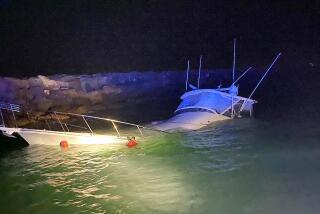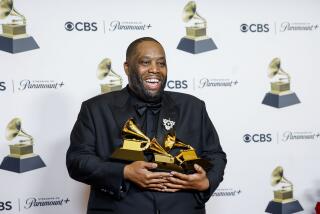D.A. Won’t File Charges Against Rodney King : Law enforcement: After an investigation, prosecutors say they lack sufficient evidence to obtain a drunk-driving conviction. The case stemmed from a CHP arrest outside a restaurant in Orange.
- Share via
SANTA ANA — The Orange County district attorney on Wednesday declined to file drunk-driving charges against Rodney G. King, the motorist whose videotaped beating by Los Angeles police officers last year triggered a nationwide furor.
After a lengthy investigation, prosecutors said they did not have enough evidence to convict King, who was arrested by the California Highway Patrol on July 16 outside a Denny’s restaurant in Orange. The CHP reported that King was driving erratically in the parking lot and had alcohol on his breath after he was stopped.
“The officers did have probable cause to believe that Mr. King was driving under the influence,” Deputy Dist. Atty. Marc Kelly said. “However, the standard of probable cause to arrest is substantially less than the prosecution’s burden of proving a criminal case to a jury.”
King’s defense attorney, Robison Harley, said there were some serious hurdles faced by the prosecution, including witnesses who contradicted the CHP version of what happened and the fact that King’s injuries from the earlier beating might explain his slurred speech and lack of coordination during field sobriety tests.
“To be perfectly honest, the D.A.’s decision does not surprise me,” Harley said. “We detailed his drinking activity that day. Two or three beers would not put a man of his size, some 225 pounds, under the influence.”
Though drunk-driving charges were not filed, King still faces a one-year revocation of his driver’s license for allegedly refusing to submit to blood-alcohol tests at Orange County Jail, where he was booked.
King, 27, was taken into custody shortly after he and his wife, Crystal, went to the Denny’s at Chapman Avenue and State College Boulevard. According to the CHP, two officers followed another traffic violator into the restaurant parking lot about 1:30 a.m. and noticed a 1986 Chevrolet Blazer backing out of a parking space in an “erratic manner” before skidding to a stop and hitting a concrete block.
When they stopped the Blazer, the officers said they recognized King and smelled alcohol on his breath. The CHP also reported that he failed his field sobriety tests.
Within days of the arrest, Steven A. Lerman, who is representing King in a civil lawsuit against the Los Angeles Police Department, denounced the incident as harassment and said that witnesses strongly disputed the CHP version of the incident. Lerman charged that if King, who is black, had been a white man and driving a BMW he would never have been stopped.
“There is no credible evidence that the police harassed King,” Kelly said. “Mr. King even said he was treated properly and so did his wife during the course of the investigation. Everything indicates that the arrest was handled very professionally by the officers. . . . This stuff about a white man in a BMW is a bunch of baloney. The officers had an obligation to protect the public and investigate.”
Although Harley contended that the CHP had “skimpy probable cause” to arrest King, he said he did not think the incident amounted to harassment based on his review of the evidence.
“I am not faulting them for the arrest,” Harley said. “CHP officers have vast discretion, but they were pushing the outside of the envelope on this one. There was nothing that egregious about his driving pattern. Usually there is something that catches the officer’s eye, and then they watch the person for a while to confirm their suspicions.”
In a prepared statement, CHP officials said King’s arrest complied with state law and the agency’s policies. According to the news release, any motorist would have been arrested by CHP officers under similar circumstances.
Including the drunk-driving arrest, King has been involved with police four times since the infamous beating at the hands of four Los Angeles officers on March 3, 1991. A videotape of the incident received international notoriety.
More to Read
Sign up for Essential California
The most important California stories and recommendations in your inbox every morning.
You may occasionally receive promotional content from the Los Angeles Times.














